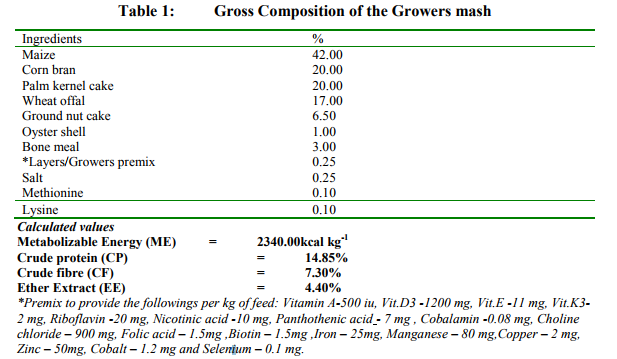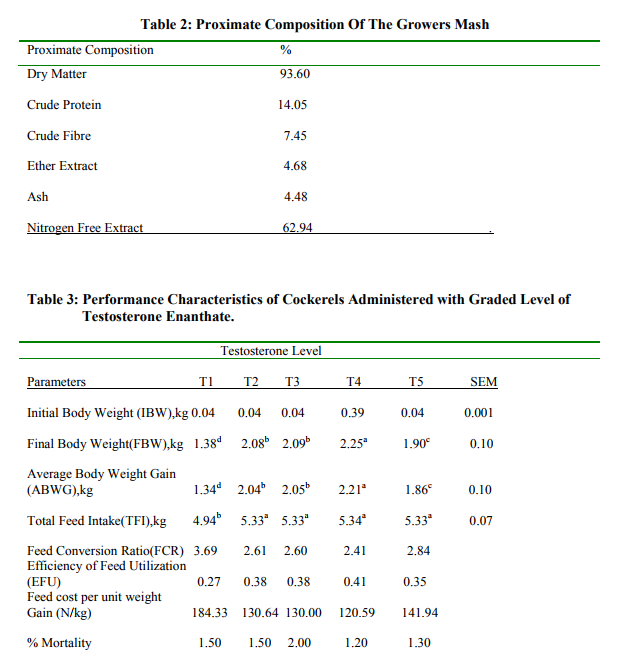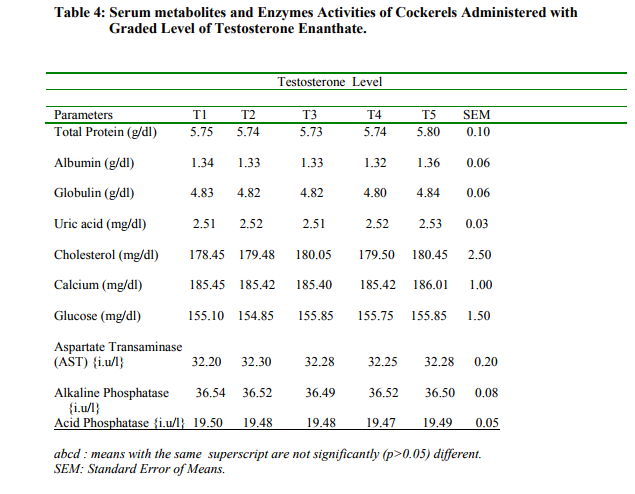IJCRR - 3(4), April, 2011
Pages: 76-82
Print Article
Download XML Download PDF
BLOOD CHEMISTRY AND PERFORMANCE CHARACTERISTICS OF MEAT-TYPE MALE
CHICKENS IN RESPONSE TO EXOGENOUS TESTOSTERONE ENANTHATE
Author: Alabi, O.M, Oguntunji, A.O
Category: Healthcare
Abstract:Performance and blood serum parameters of meat type cockerels on five different levels of Testosterone
Enanthate were investigated. Parameters measured included Total Feed Intake(TFI),Initial Body Weight(IBW),Final Body Weight(FBW).Total Body Weight Gain(TBWG),Feed Conversion Ratio(FCR),Efficiency of Feed Utilization(EFU),Feed Cost per unit body weight gain(US$/kg),Total Protein(TP), Albumin(ALB), Globulin(GLB), Uric acid, Glucose, Cholesterol, Serum calcium and enzyme activities. The results revealed that the dosage of the testosterone enanthate had significant (p< 0.05) effect on the performance characteristics investigated. Birds on 0.3mg/kg body weight gave the best results with respect to FBW, FCR, EFU and cost effectiveness. Meanwhile, the serum metabolites were not significantly (p>0.05) affected by the dosage of the exogenous hormone. Exogenous testosterone enanthate can be used to enhance the growth of meat type cockerels economically without adverse effect on the birds.
Keywords: Cockerels, Performance characteristics, Serum metabolites, Testosterone Enanthate
Full Text:
INTRODUCTION
The use of hormones such as progesterone, trenbolone, zeranol, testosterone; antibiotics and feed additives are still allowed by the Food and Drug Administration of the United State of America1 and as part of the application of biotechnology for improving feed characteristics, hormones and probiotics are being used as supplements.2 Hormones have been used widely to induce molting in broiler breeder hens,3 inhibition of egg production,4 while laying period of hen can be extended with the use of progesterone.5 Broiler chickens are the major source of table meat but due to high cost of day old broiler chicks and feed, poultry farmers in many tropical countries have resorted into the commercial rearing of cockerels which in actual fact are hatchery wastes in many developed countries.6 In the tropics, cockerel keeping is an important and cheaper way of ameliorating the prevailing animal protein needs. Their cheaper cost at day old, ease of rearing, hardiness and less dependent on high quality feeds present them as suitable objects for food security 7 but they mature over a longer period of time of about twenty or more weeks.8 Various methods have been tried towards promoting growth rate among livestock and apart from nutritional manipulations, the use of natural hormones and other natural growth promoters are practicable. Hormones are widely adopted by farmers to enhance growth and reproductive performances in livestock production without adverse effect on animals and humans after consuming the products thereof.9 Testosterone enanthate is an esterified form of the natural steroid. It is anabolic in action and is secreted by the endocrine glands mostly by the male testes.10 It was reported11 that exogenous testosterone enanthate influenced the live weight of both male and female pigs positively and also that the haematological and serum biochemical values of the pigs were variously affected by the exogenous hormone. The objective of this study is therefore to investigate the effect of testosterone enanthate on the performance of cockerels in terms of feed intake, growth rate, feed conversion ratio, economy of production and physiological response in terms of the serum metabolites profile. food security 7 but they mature over a longer period of time of about twenty or more weeks.8 Various methods have been tried towards promoting growth rate among livestock and apart from nutritional manipulations, the use of natural hormones and other natural growth promoters are practicable. Hormones are widely adopted by farmers to enhance growth and reproductive performances in livestock production without adverse effect on animals and humans after consuming the products thereof.9 Testosterone enanthate is an esterified form of the natural steroid. It is anabolic in action and is secreted by the endocrine glands mostly by the male testes.10 It was reported11 that exogenous testosterone enanthate influenced the live weight of both male and female pigs positively and also that the haematological and serum biochemical values of the pigs were variously affected by the exogenous hormone. The objective of this study is therefore to investigate the effect of testosterone enanthate on the performance of cockerels in terms of feed intake, growth rate, feed conversion ratio, economy of production and physiological response in terms of the serum metabolites profile.
MATERIALS AND METHODS
A total number of two hundred and fifty black cockerels of Harco strain from a reputable hatchery was used for this experiment. They were procured at day old, weighed at arrival and brooded for five weeks the time during which they were fed with commercial chick mash with the intake being monitored. At 6th week of age, 225 chicks were randomly allotted into five treatment groups; T1= No testosterone, T2= 0.1mg of testosterone per kilogram body weight (kbwt), T3= 0.2 mg/kbwt, T4= 0.3 mg/kbwt and T5= 0.4 mg/kbwt. Each treatment group had three replicates of 15 birds each in a Completely Randomized Design (CRD). The birds were allowed to adjust for one week and at 7th week of age, exogenous administration of testosterone enanthate started. The birds were injected between the hours of 7.00 am and 8.00 am intramuscularly at 7th, 8th, 9th and 10th week of age consecutively. Blood samples were collected from the birds at 7th week before administration of hormone started and at 12th, 16th and 20th week of age. Samples so collected were analysed for total protein, albumin, globulin, uric acid, cholesterol, glucose, and calcium and serum enzymes such as Aspartate transaminase, alkaline phosphatase and acid phosphatase. Blood samples were analysed for the serum metabolites using the enzymatic procedure earlier described.12, 13 Data were subsequently collected in respect of weekly body weight, weekly weight gain, mortality rate and feed intake on cumulative basis while FCR and EFU and feed cost per unit weight gain were calculated. Exogenous Testosterone and Blood Parameters of Cockerels Feed and water were supplied to the experimental birds ad libitum while general routine management practices in respect of vaccination and medication were strictly observed. Meanwhile, the average cost of feed per kilogram during the experiment was N50.00 (US$0.34). The proximate composition of the feed was determined by the methods as earlier described.14
Statistical Analysis
All data generated were subjected to statistical analysis using Analysis of variance procedure of Statistical Analysis Software.15The treatment means where significant were separated using the Duncan option of the same software. the gross composition of the grower mash fed to the experimental birds while Table 2 shows the proximate composition thereof. Table 3 shows the performance characteristics of the cockerels administered with graded levels of Testosterone enanthate. Parameters investigated were Initial body weight (IBW),Final body weight(FBW),Body weight gain(BWG),Total feed intake (TFI) and mortality rate while FCR,EFU and feed cost per unit weight gain were calculated. From the results in Table 3, IBW was the same for all the treatment groups being the average body weight at day old. However, FBW, BWG and TFI were influenced by the exogenous hormone. For FBW, the range was from 1.38kg (T1) to 2.25kg (T4). No significant (p>0.05) difference was observed between the means for T2 and T3 but they differed significantly (p0.05) difference was observed between the intake of birds in T2, T3, T4 and T5 but they all differed significantly (p0.05) affected by the exogenous testosterone enanthate.
DISCUSSION
Testosterone enanthate improved the feed intake of the birds as reflected in the results of this experiment. Being an anabolic steroid, testosterone promotes bone elongation and muscle build-up and it acts on the receptor for appetite stimulation on the hypothalamus hence the increased feed intake. This finding agrees with the earlier report16 that anabolic steroids promote feed intake and body growth in beef calves production. As a result of the enhanced growth with exogenous testosterone, the FCR was better than those in control group so also the EFU with the best result from birds in T4. These imply that the rate at which the feed was utilized to gain body weight was Exogenous Testosterone and Blood Parameters of Cockerels highly efficient with testosterone enanthate and consequently the feed cost per body weight gain. The findings revealed that it is cheaper and faster to raise cockerels to market weight with exogenous testosterone. The mortality rate can not be linked with the effect of exogenous testosterone. Meanwhile, the serum metabolites were not affected by the exogenous testosterone. This implies that the health status and the liver functions of the cockerels were not negatively affected by the testosterone enanthate administration. This agrees with the findings of 17 that reported that the serum metabolites of castrated and intact male pigs were not affected by exogenous testosterone.
CONCLUSION
The findings of this experiment suggest that exogenous testosterone enanthate can be used to enhance the growth of cockerels to market weight with cheaper cost of production and without deleterious effect on the birds and with the best results obtainable with administration of 0.3mg of the testosterone per kilogram body weight of the birds. Exogenous Testosterone and Blood Parameters of Cockerels



References:
1. Aumaitre,A. Quality and Safety of Animal Production.Proc.8th World Conf.on Anim.Prod. 1998; 189-201.
2. Bonneau,M and Learveld,B. Biotechnology in Nutrition Physiology and Animal Health. Proc. 8th World Conf.on Anim.Prod.1998;312-331.
3. Attia,Y.A.,Burke,W.H.and Yamani,K.A. Response of Broilers Breeder Hen to Forced moulting by hormonal and dietary manipulations. Poult.Sc.1983; 73(2):245- 258.
4. Dvorak,M.,Sevcik,B.and Hylik,J. Effect of @33828 on delay of egg production in Pullets and on moulting hen. Veterinarian SPOFA, 1971; 13(5/6):285-296.
5. Prochazka,F.,Hylik,J., Sevcik,B. and Dvorak,M. Effect of VUFB 7319 on inhibition of egg production at the end of laying period and on forced moulting. Veterinarian SPOFA,1971;13(5/6): 329- 345.
6. Alabi, O.M. Effect of Weather Variations on Commercial Broilers Production in South-western Nigeria. Thesis: Dept Of Animal Sc University of Ibadan,Nigeria,1997.
7. Obioha,F.E.and Abnikwe,P.E.N. Utilization of ensiled and sun-dried cassava peels by growing swine. Nut.Rep.Int., 1982;26:961-972.
8. Oluyemi, J.A. and Roberts, F.A. Poultry production in Warm wet Climates. Spectrum Books Ltd. 2000.
9. Ferrando,R. Method of measuring hormone levels in Animal Production. In: Sterol Analysis,Muskin, Grower and Kirk(Eds) Lc and Fertilizer,New York,1990.
10. Adejumo, D.O., Ladokun, A.O., Ososanya, T.O., S okunbi,O.A.and Akinfemi.Haematology and serum biochemical changes in castrated and intact Male pigs administered testosterone enanthate: Proc.18th Ann. Conf. of Anim. Sc. Ass.of Nig.(ASAN),2005, 93-95.
11. Ladokun,A.O.Exogenous hormonal regulation of growth rate,blood chemistry And Fertility in Pigs. Ph.D.Thesis,Department of Animal Sc.University of Ibadan,Nigeria,2006.
12. Henry,R.H.,Sabel,C.and Berkman,S. On the determination of Pancreatic Lipase In Serum Clichem,1957;3:77
13. Kohn,J. A cellulose Acetate supporting medium for some electrophoresis. Clin. Chin. Acts, 1957;,2:297.
14. A.O.A.C.Association of Official Analytical Chemists. Official methods of Analysis. 11th Ed. Washington, D.C.1990.
15. SAS. Statistical Analysis Systems. Institutions Users Guide, SAS Institute, Cary, N.S.1999. Exogenous Testosterone and Blood Parameters of Cockerels.
16. Anthony, R.V., Bellows, R.A., Short, R.E., Staigmiller, R.B., Kaltenbach, C.C and Dunn, T.G. Fetal growth of beef calves.1.Effect of Prepartum Dietary crude Protein on birth weight, blood metabolites and steroid. Hormone concentrations.J.Anim.Sci, 1986; 62:1363-1374.
17.Adejumo,D.O.,Ladokun,A.O.,Ososanya, T.O.,Sokunbi,O.A.and Akinfemi. Haematology and serum biochemical changes in castrated and intact Male pigs administered testosterone enanthate: Proc.18th Ann. Conf.of Anim. Sc. Ass. of Nig.(ASAN),2005; 93-95.
|






 This work is licensed under a Creative Commons Attribution-NonCommercial 4.0 International License
This work is licensed under a Creative Commons Attribution-NonCommercial 4.0 International License